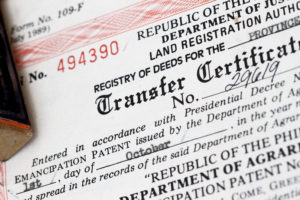One big reason people want to buy their own home instead of continually renting is because they can do whatever they want with the property! Paint the walls dark purple, turn the dining room into a tiki bar, keep a fish tank in your bathtub – the choice is yours, not your landlord’s.
Not so fast.
Click to get pre-approved for a home mortgage!
Many properties actually do have rules about what you can do with your home, and first time should know what they’re getting into. These stipulations are known as real estate deed restrictions, and this is how they work.
What are deed restrictions and what do they do?
A deed is to property as a title is to a car. It’s a legal document that represents the property, and details things like who owns it, where it is located, and what it’s for. Many people know about zoning restrictions, which are a pretty modern invention – telling you if a property is commercial, industrial, or residential. Deeds can go beyond that, though.
Certain sections of a deed called conditions, covenants, and restrictions can be added by the property’s original owner, builder, developer, past owner, current owner, or the neighborhood or homeowner’s association the home is found in.
Some deed restrictions are meant to maintain unity in the neighborhood. Sorry, you can’t deck your home out like the witch’s gingerbread cottage in Hansel and Gretel – at least not permanently! Sometimes they are meant to keep all properties in a neighborhood or on a street relatively equal, to maintain an equal value. You might not be allowed to double the size of your home, for example, or turn your whole yard into a massive pool. Deed restrictions have even been used to try to save historic homes. A home with a deed restriction that doesn’t allow it to be torn down except with a court order, for example, won’t be very appealing to developers looking for a property to build new apartments.
Examples of the types of deed restrictions you might find
- The size and number of additional rooms and structures
- What materials the structures can be made of
- Proximity to other structures, properties, or streets
- The density of buildings per acre
- Style of homes allowed
- Landscaping
- Exterior paint colors
Here are some other common deed restrictions:
- Pets (the number you can have, the size, even the breeds)
- Neighborhood amenity fees
- Home-based businesses
- The ability to rent out your home
- Outdoor storage
- Yard maintenance rules
What happens if you ignore the deed restriction?
Deed restrictions are a civil matter. You won’t be breaking the law by ignoring them, but you are very likely to be fined – and, if possible, made to undo whatever you did to earn the fine in the first place! You would likely have to pay either the developer, the neighborhood association, the homeowner’s association, or whomever else put the deed restrictions in place. Any of these groups or individuals can use lawsuits to enforce deed restrictions.
Researching deed restrictions
You can find out if there are deed restrictions on a property in several ways:
- Ask the homeowner directly about any deed restrictions.
- Check with the county clerk to see the title abstract. This shows you not just the deed, but details of the deed for the last 50 years, so you can see if and when deed restrictions were added.
- Check with the homeowner’s association or condo board, if applicable.
- Ask your real estate agent! Part of your agent’s job is property research and making sure there are no unpleasant surprises when you’re buying a home.
If you are pressed to make an offer on the property before you have had a chance to read the deed restrictions, insert a contingency clause in your offer stating that you are to be given time to read the conditions and have the ability to back out of the contract if you disapprove.
Deed restrictions can be changed, but it can be a costly, lengthy effort to get it done. So make sure you are comfortable with the restrictions on the property before you buy!
Questions about deed restrictions? Please contact me!. And remember, friends don’t let friends buy a home without Agent Lady!
About Agent Lady: Cherise Wynne is a leading real estate agent in Philadelphia, helping home buyers and sellers navigate the City of Brotherly Love, with a special focus on first time home buyers. To chat about getting started with your first time home buying experience, click here.



